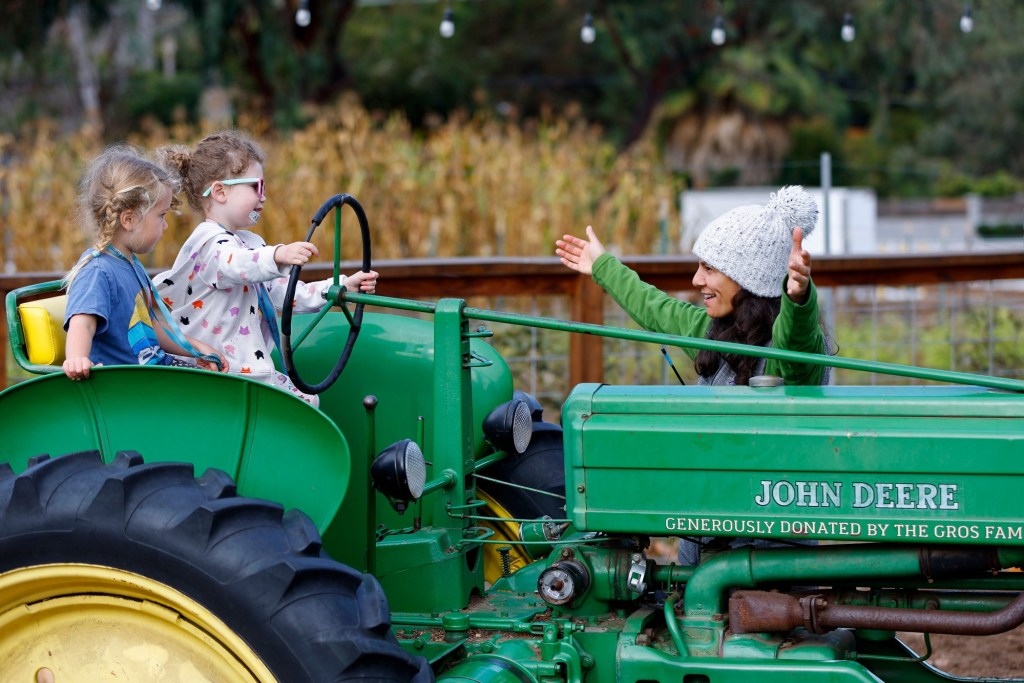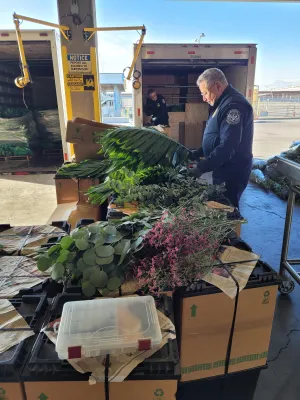
The sound of children singing about corn, squash and beans could be heard from hundreds of feet away at Coastal Roots Farm on Wednesday morning, as about 30 kids gathered for their final day of Farm Camp.
“It’s a field of earthworms, it’s a field of sunshine, it’s a field of rainbows. It’s a field of love between my brothers and my sisters,” they sang, seated in a half-circle in a gazebo and signing the lyrics.
Their song, called “Together We Grow,” celebrated the Indigenous “Three Sisters” farming technique, which involves planting the three crops near each other to help them grow symbiotically.
Music and movement are just some of the many activities campers can participate in at Coastal Roots Farm in Encinitas. The camp, held throughout the year on school holiday breaks, immerses kids from preschool through fifth grade in sustainable agriculture, cooking, crafts and science experiments.
This week’s three-day camp focused, fittingly, on gratitude. And though children at Farm Camp have been singing the “Three Sisters” song since the crops were planted earlier this summer, it holds a special significance now.
“We talk about the Kumeyaay and Luiseno tribes,” said Sharone Oren, the farm’s education manager. “We talk about how they nourished and sustained the land for us, and that now we are continuing that work.”
And the kids can learn lessons from the plants themselves. Camp discussions, Oren says, center on “how can we as a community work together and give each other what we need, so that we can be the best that we can be” — much like the Three Sisters.
Farm Camp mixes agricultural education with social and emotional skills, such as working together and helping people feel accepted, and it emphasizes the connections between people and the land.
And as a nonprofit Jewish community farm, it also incorporates Jewish values into its lessons, including mutual care, interdependence and wonder. But the camp is open to children of all faiths and backgrounds.
“There’s just so many different layers,” said San Marcos resident Trudi Andres when she dropped off her 9-year-old son, Mack, at the camp on Wednesday. “You have sustainability, the different cultural perspective, the different language … and different ways of food, but also community.”

Coastal Roots Farm, founded 10 years ago, grows everything from tomatoes and leafy greens like kale and lettuce to basil and parsley on its 18 acres in Encinitas. It donates the vast majority of the vegetables it grows to community members and organizations in North County.
It’s been running Farm Camp for about six years, serving around 800 children each year. Tuition ranges from $90 to $420, but Oren says the farm offers a scholarship program that can cover up to 90% of that.
Along with the camp, the farm also hosts environmental education programs that serve about 12,000 children each year and serves thousands more people with its pay-what-you-can farm stand, open two days a week, and its free food deliveries to community members.
The camp has a designated garden it uses for educational purposes — but the fruits and vegetables children grow there can also be folded into the farm’s community food distribution.
“It’s not a symbolic contribution — that really does make a real difference in the space we’re stewarding here,” said Kesha Dorsey, the farm’s communications director.
Coastal Roots donated more than 90% of its harvest last year to local organizations and residents, including to Holocaust survivors living in North County, tribal communities, the Vista Community Clinic and the Encinitas Community Resource Center’s Food and Nutrition Center.
“We try our best to provide food security, but also nutritional security,” said Sloan Chau, the food and nutrition program manager at the Community Resource Center.
Patrons often want fresh produce, but it isn’t always consistently available, depending on the season and what grocery stores and other donors give. “Partnerships like with Coastal Roots really help supplement us,” Chau said.

Just as the farm helps community members, it’s also changing the lives of its campers.
Andres’ son Mack “can’t get enough” of camp. Now in fourth grade, he’s been attending for several years. He most enjoys its leadership and counselors.
“I think that people who are here are just really caring and nice and helpful,” he said. After he ages out of camp, he might want to join its counselor-in-training program.
Andres notices a difference in her son when he gets home from camp each day — as if the farm gives him a “nervous system reboot” that relaxes him.
That ease is clear among many of the kids.
In the morning, before circling up to sing and learn their Hebrew word of the day — Wednesday’s was mishpachah, or family — the kids fluttered around the space, jumping onto logs and climbing on playground equipment.
Some ran up to Oren and the camp counselors to say hello. One boy, who also attended all summer, asked what had happened to the tomatoes and cucamelons — a fruit that looks like a tiny watermelon but tastes like a cucumber.
“We’ll plant them again next summer,” Oren told him, before he bounded away to help a counselor grab something from the shed.
Free time is intentionally built into each camp day.
“Part of the thing is running around here … and really encouraging kids to explore in nature,” Dorsey said. “So many of these kids have such structured lives.”
But throughout the day, the kids will help out with farm chores and perform helpful science experiments, such as soil testing to learn the difference between soil and dirt and the importance of soil nutrition.
They will also cook meals and snacks, often with produce from the farm. On Monday, they made chili and cornbread to share with their parents on Wednesday afternoon as camp ended.
For 7-year-old Esther, who loves snacking on the farm’s fresh tomatoes, preparing the meal was the best part.
Her mother, Rebecca Fielding-Miller, appreciates that the camp instills values of community and sustainability while letting her daughter spend quality time outside. For her, it’s worth the drive from their home in Kearny Mesa.
“I mostly just love that she gets to roll around in the dirt and come home filthy,” Fielding-Miller said. “I think that’s good for kids.”
Originally Published:






